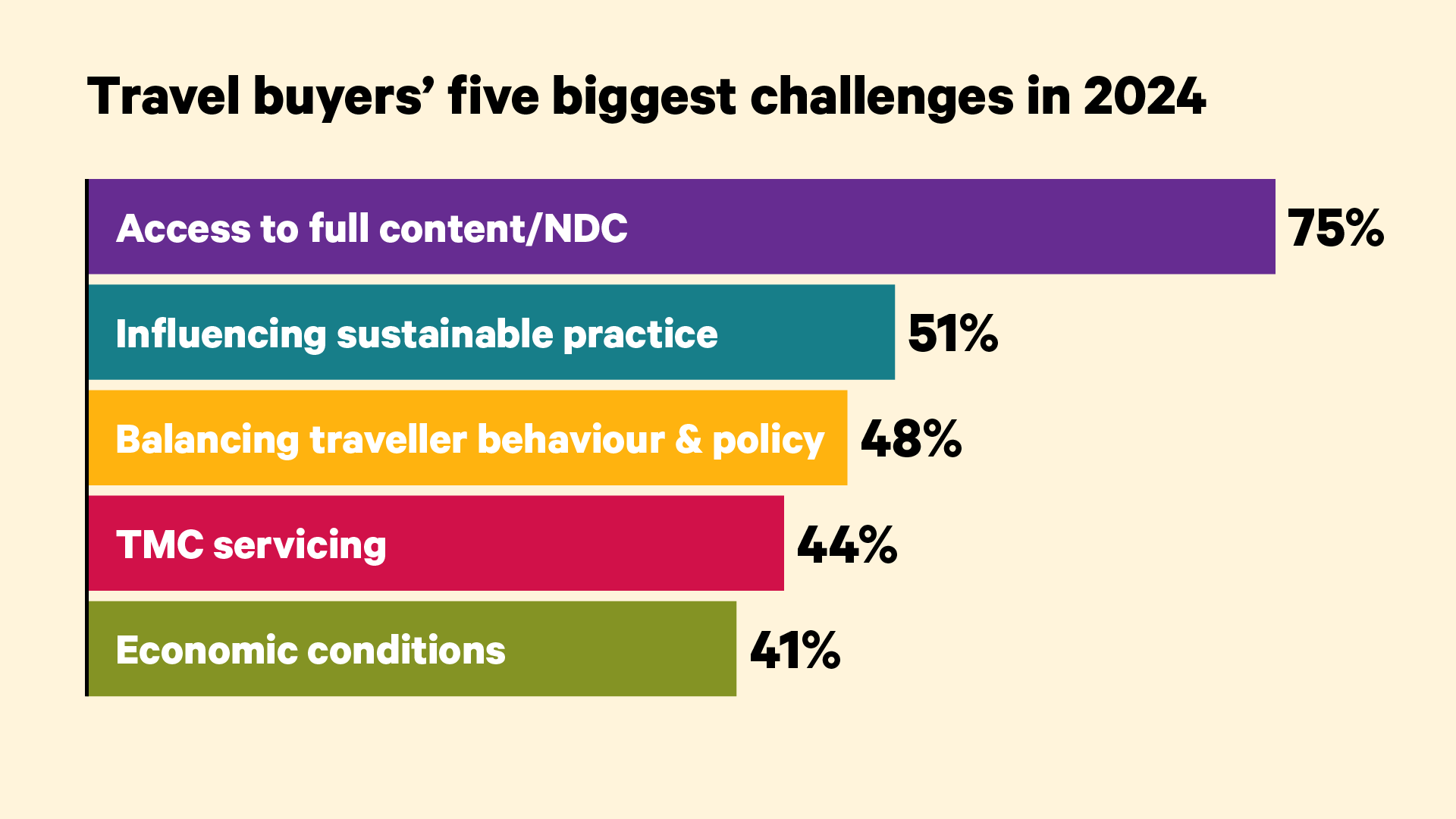CONTRACTS & SERVICING
PLUS ÇA CHANGE…
The post-pandemic landscape offered corporates and TMCs the chance to reassess historic contract and servicing standards, but does it just remain ‘business as usual’?

By Rob Gill (published 19 February 2024)

With all the talk this year of the ‘stabilisation’ and ‘normalisation’ of the European business travel market following the trauma of the pandemic, many have found it an appropriate time to reassess corporate-TMC relations and the often complex issue of contracts, fees and servicing.
The past couple of years have been dominated by rocketing travel prices and the difficulties faced by TMCs and other suppliers of scaling their staff back up after the departure of so many employees during the Covid-19 crisis.
As the dust settles, what’s the latest on the ever-vexing issue of TMC charges and fees, as well as service level agreements (SLAs)? Are we now in a new paradigm or have we seen a return to pre-2020 practices and expectations?
NEW PRICING MODELS
Transaction fees – and management fees to a lesser extent – seem to have been around forever as the primary way for corporates to pay for TMC services. But there are other models that have been in the spotlight recently such as subscription fees, which operate in a similar way to established concepts such as software-as-a-service.
“The pandemic exposed the shortcomings in the traditional transaction fee model for both TMCs and buyers,” says Raphael Pasdeloup, SVP of enterprise customers and consulting services at CWT. “There has been growing interest in different fee structures – particularly subscription pricing – but the shift away from transaction fees has been gradual, as this model has been in place for a long time.”
Jean-Michel Kadaner, a partner at Paris-based Areka Consulting, says there are now “so many different ways” to remunerate TMCs, including agreements based around direct operating expenses and performance.
Kadaner predicts a new landscape that will be “increasingly hybrid”, as relationships become more complex with the integration of technology – both through TMCs and other third parties. “The list is long and depends on the level of outsourcing activities the customer wants to delegate to the TMC,” adds Kadaner.
But despite these changes, Kadaner says: “We are in a transactional business – per trip or per PNR – so it will still be mostly a transaction fee-based business.”
Jeff Klee, CEO of US-based TMC AmTrav, suggested two “superior” pricing structures in a recent Company Dime column: a fee-per-trip model with a flat charge for a whole itinerary regardless of how it is booked, or a flat fee for every active traveller on a TMC platform, which does not take into account the number of trips or service requirements.
As for recent trends in the level of TMC fees, while many contracts automatically allow fees to increase in line with inflation, “fierce competition” is helping to restrain these rises in new contracts.
SERVICE EXPECTATIONS
There were initially many complaints from buyers about service levels at TMCs post-Covid as they struggled to rebuild their teams quickly. But at the same time, there was also better understanding about the benefits of a deeper relationship between clients and TMCs.
Fortunately, the staffing situation at most TMCs has now improved dramatically. Kerry Douglas, head of programme at the UK's Institute of Travel Management (ITM), says: “The recruitment situation has definitely eased, but the industry does still have some residual challenges in attracting talent. Most ITM buyers are telling us that TMC staff levels are aligned with demand and service level agreements are generally being met.”
Christoph Carnier, president of German buyer association VDR and head of procurement for travel, fleet and events at Merck, says there is now a trend of corporates paying a “minimum amount in order to maintain a minimum level of service” when there is a “complete reduction” in the use of TMC services.
“In my opinion, the development in the handling of RFPs helps TMCs to protect their business more and even to survive crises better,” adds Carnier. “This ultimately increases their attractiveness and helps to attract more staff.”
In a recent interview with BTN Europe, GBTA president and executive director for global travel at UBS Mark Cuschieri said the role of the TMC was changing and buyers needed to “demonstrate the value” of the relationship.
“Does measuring the telephone service of an agency really demonstrate value?” he asked. “It demonstrates accessibility. Does it demonstrate that the service provided was excellent? That piece seems to be missing.”


OUTLOOK FOR RFPs
According to the ITM, there doesn’t seem to be a stampede for corporates to launch new RFPs for their TMCs in 2024. Only 19 per cent of ITM buyer members are planning a full RFP this year – up from 12 per cent last year but well down from the figure of 35 per cent in 2020. Some 12 per cent of buyers will instead extend their TMC contract this year, down from 17 per cent last year.
The main priorities for those going out to tender, according to the ITM, are the TMC’s capability to provide solid support and to deliver access to NDC and other fragmented content.
“Several buyers expressed concerns about going to tender for their TMC or online booking tool in the current airline distribution environment, which they described as a minefield,” adds ITM’s Kerry Douglas.
There have been suggestions that TMCs are deciding not to bid on more RFPs these days, which may make buyers’ lives easier as they only have to assess suppliers who really want their business and, in theory, are best suited to manage it.
“Do not forget that an RFP is a very costly exercise for all parties – a real investment for the future – and the customer approach needs to be credible for the potential tenderer to enter the competition,” says Areka’s Jean-Michel Kadaner. “Too often in the past RFPs were launched only to benchmark or because it was the time to do so by procurement rules.”
CWT’s Raphael Pasdeloup says the TMC has not seen an increase in its percentage of “no bids” on RFPs during the past five years. But he adds: “I think all TMCs now are doing more rigorous evaluations on which RFPs to participate in. The biggest reason for a no-bid is a lack of interaction prior to the launch of an RFP.”

(Source: ITM’s 2024 Buyer Priorities report)
(Source: ITM’s 2024 Buyer Priorities report)

(Source: ITM’s 2024 Buyer Priorities report)
(Source: ITM’s 2024 Buyer Priorities report)

(Source: ITM’s 2024 Buyer Priorities report)
(Source: ITM’s 2024 Buyer Priorities report)

TRANSPARENCY PLEA
One word that comes up regularly from both sides of the TMC-buyer debate is transparency, and from corporates there is also a renewed recognition that TMCs need to be profitable to be a good partner in the long-term.
“It is not in the interest of a buyer to work with a supplier where they are a loss leader or they're not profitable because that doesn't help either the supplier or the buyer,” says Mark Cuschieri. “It's important to understand what profitability will be made out of that relationship and how it benefits everybody.
“Why shouldn't those discussions be held now? Is that a subscription [model]? Is that a management fee? Is it a transaction fee? Whatever is best, those conversations should take place. Why can't we have those conversations in a very transparent way?”
ITM’s Kerry Douglas agrees: “Buyer members understand that the commercial model behind TMCs is evolving and, as always, they welcome conversations about how and why – the more transparent the conversation, the better. The issue is that buyers never know exactly how TMCs are making their margins.”
Relationships between TMCs and buyers have always been complex and that’s only going to increase in the current environment. The time seems right for full and frank conversations to forge mutually fruitful relationships.


